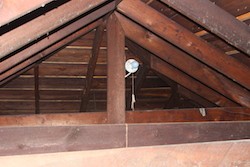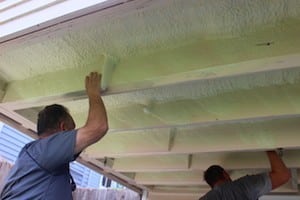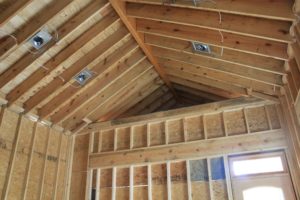
While it’s not uncommon to find materials like newspapers, corncobs, or even horsehair serving as insulation in historic homes, more often than not in New Orleans, there’s simply no insulation at all. Compared with other areas of the country, southern Louisiana wouldn’t have had the dire need to trap heat during the winter, and our homes were actually built to encourage the flow of air during the summer.
Back in the good old days, recall, there were no air conditioners – energy efficient or otherwise, and so people relied on fans inside to circulate cool breezes pulled in through wide open windows and transoms over doors throughout the house. Shutters allowed the passage of air while blocking the warming effects of the hot sun, and homeowners spent significantly more time on their front porches visiting than inside anyway.
Today, we’ve become accustomed to conditioned air, and most homeowners like to keep their homes relatively cool. Electricity used just for air conditioning in the South has increased 43% since 1993, and while the American Society of Heating, Refrigerating and Air Conditioning Engineers (ASHRAE) finds most people are comfortable within the 73° to 79°F summer temperature range, there are many homeowners who keep their thermostats set at a much lower temperature. No one can argue that air conditioning hasn’t improved the comfort of New Orleanians, but it has come at a steep energy cost. Fortunately, insulation can reduce the amount of energy required to run your air conditioner in the summer and your furnace in the winter by 30% or more.
In your historic home, there’s a good chance that your attic was not created as living space, which means it’s unfinished. In other words, you won’t have to worry about doing damage to your home’s structure or charm by adding insulation there. For maximum insulation, we recommend open cell spray foam insulation, which can be applied directly to the attic’s roof joists, preventing the penetration of radiant energy from the sun.

Insulating crawl spaces beneath older raised homes is another way to conserve your energy during months with extreme temperatures. We propose the use of closed cell spray foam beneath your home, as it adds a moisture barrier in addition to insulating benefits. An insulated crawl space prevents unconditioned air from creeping in through floorboards during the winter and summer, undermining your heating and cooling efforts, and it also averts the growth of mildew and mildew, which is common in our humid climate.

It is possible to insulate your home’s walls, and it can be a straightforward process. If you’ve removed old wall coverings, open cell spray foam can be applied between joists; if you’re only looking to add insulation, blown in cellulose can be added to exterior walls through small entry passages drilled into walls. However, historic homes can make this process more complicated, and a professional contractor should always be consulted to prevent fire hazards or damage to your home’s structure. In fact, you may find once your attic and crawlspace have been insulated, that the benefits of wall insulation would be negligible anyway.
If your historic home is undergoing a makeover, consider the benefits of insulation. Properly insulating the attic and crawlspace of your historic home will reduce your energy loss, optimize your HVAC unit’s performance, and ensure comfort throughout the year. You’ll save money and feel better. Give us a call at Sunlight Contractors if you’re interested in learning more about insulating your older home from our expert contractors.
Locations:
Main Office: Sunlight Contractors, LLC 2323 Bainbridge St #110, Kenner, LA 70062 (504) 919-9993
New Orleans location: Sunlight Contractors, LLC 650 Poydras St, Suite 1400, Rm 33, New Orleans, LA 70130 (504) 302-0058
Proudly Serving the following areas:
[wpgmza id=”2″]
